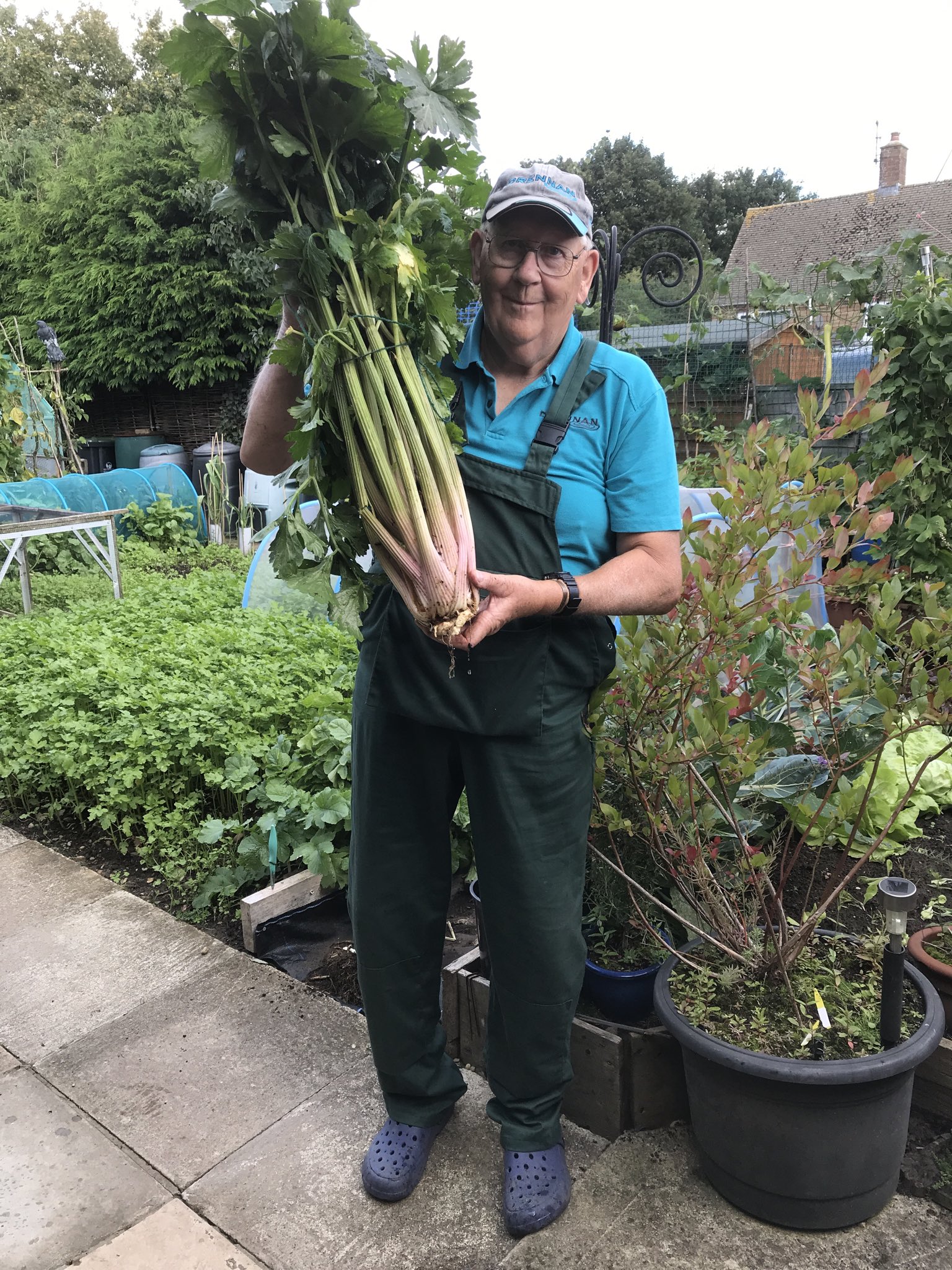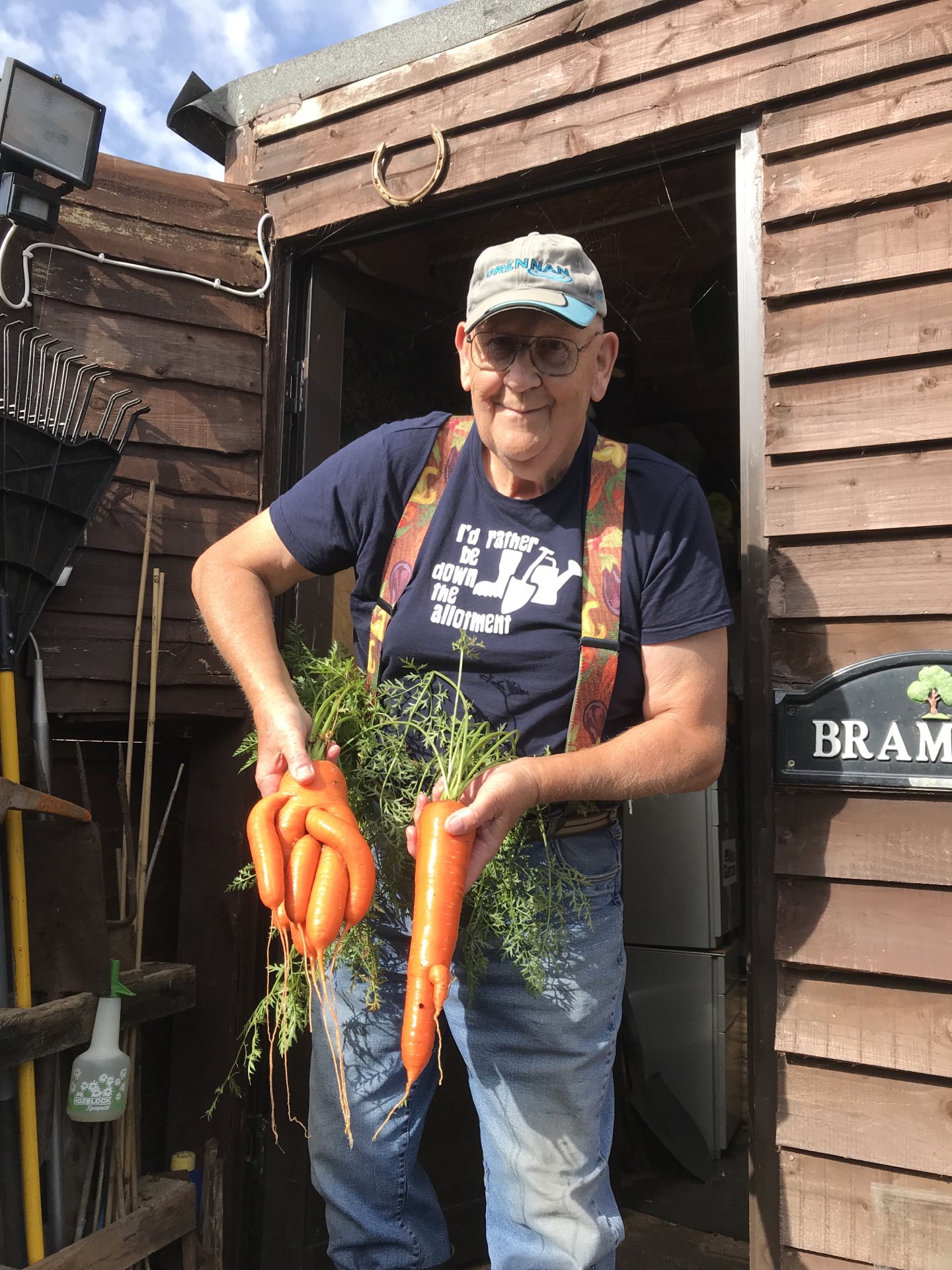Roar writer Karen Ng interviews Gerald Stratford, author of Big Veg, and discusses his attitude towards gardening and life, his varied career path and inspirations, his experience in gardening shows and within the gardening community, as well as his favourite places in Milton-under-Wychwood, where he lives. He also offers advice for budding gardeners, and explains how someone living in an urban environment can become a gardener too.
Gerald Stratford is the seventy-two-year-old gardening sensation who rose to fame online in 2020. Known for his down-to-earth personality, he regularly posts about his garden and “big veg” on his Twitter, where he first went viral. Gerald has since been featured across numerous platforms as well as Gucci’s “Off the Grid” campaign. His debut book Big Veg will be published this September.
Roar: What does gardening mean to you? What inspires you when you garden?
Gerald: I’ve always had an affinity with the soil. Whenever I’m doing something with soil, I’m happy. And if I’m happy and doing things, it makes me feel good. I think my plants enjoy it as well. It’s not nice to do anything under duress.
R: I agree. Could you tell me about the appeal of growing your own vegetables – and of growing big vegetables?
G: When I grew up in the ’50s with my brothers and sisters helping mother and father, we didn’t have supermarkets. There were only one or two shops, and we came from quite a poor background. If you didn’t grow or produce food, you went hungry. So that’s carried me – though I’m not hungry anymore [smiles] – you know, the love for the soil and growing vegetables has just come through my life. The love for growing “big veg†is an offshoot of my regular gardening. I’ve been doing that for about five years. It’s just another side of my gardening life. For many years, I used to fish a lot. When you fish, you catch a fish that long [holds up his hands to demonstrate]. Next time you go fishing, you go a bit bigger. I thought, I wonder if I can do the same with vegetables? So I investigated, and that’s what I do now.
R: I only have a little experience in gardening small vegetables, so I can’t even imagine trying to grow big vegetables.
G: I try to grow my big vegetables in the same time span as small vegetables. It’s a common feeling amongst people who don’t know – that if something is big it won’t be very nice; it might be tough and old. That’s not the case: if you can grow something in a certain length of time, it will be tender and tasty!
R: What are your favourite things to cook, with vegetables you’ve grown?
G: Oh… [thinks] I like onions and potatoes. Onions, like potatoes, are a staple in lots and lots of cooking. So you need a lot of potatoes and a lot of onions. We are self-sufficient in vegetables – Elizabeth and myself. Nothing complicated, but a nice big potato baked in the oven the traditional way, until it’s piping hot with a nice crunchy skin. You slice it in half, and open it out all steam and lovely, and just have something like some nice butter, or some nice cheese just laid on top. And you let the heat melt, and then it goes through the potato. Everything can be eaten; there’s no waste.
R: That’s making me hungry – the way you described it just now, even though I’ve just had dinner.
G: [laughs]
R: You mentioned that you used to fish a lot. I read that you’ve had such a wide-ranging career path – you used to be a fisherman, an improver, a barge controller. Could you tell me a little about that?
G: I left school when I was sixteen and I had an apprenticeship as a butcher. The apprenticeship lasted five years, followed by three years as what is called an improver – which is quite long, but back then it was very thorough. The apprenticeship wasn’t just about cutting up meat. If a lady in and bought a piece of pork, and said ‘how would I cook it?’, you would be expected to be able to tell her how to cook it. The training was very thorough, and included marketing and advertising.
When I got to my early twenties – say twenty-three, twenty-four – I really wanted to work outside. I didn’t like a roof over my head. I was looking to get a job on the River Thames, basically just doing general work afloat, controlling barges and various things. I’d become a barge controller. That’s the title. That was going up and down the River Thames on a professional basis, like a lorry driver would do things on the road, except I was afloat on the river. I thought that job was a job for life.
But like most things, me and quite a few other people were made redundant – which was quite a shock in the mid-’90s. I had one or two jobs since then, because I’m not the sort of person to be unemployed. You become a statistic if you become unemployed, and that’s horrible. The last ten years of my working life, I looked after a sports club, where rugby, football, cricket were played. We also had a conference facility that I used to manage. That’s me in a nutshell! [laughs]
R: That’s really admirable. You’ve gone in so many directions – that’s so cool.
G: I think times have changed from being in one job all your life. Modern life now doesn’t push for that.
R: It’s more flexible.
G: Yeah.
Let hope we have turned the corner with the pandemic cheers pic.twitter.com/fcDr0pPzhP
— gerald stratford (@geraldstratfor3) May 17, 2021
R: Straying a little from what we’ve been talking about – what has your experience in gardening shows and competitions been like? What is it like to prepare for a show?
G: Leading up to a show – sort of the weeks and days ahead – is all about preparation and getting everything in perfect condition. You know, the last two days before a show can be very frenetic for me. I’m lifting the carrots, the parsnips, the tomatoes, cleaning them, keeping them in a fresh condition. I have been known to stay up all night, the night before a show, just looking after them. They are all my children. Then on the day of the show I load up the truck and go to the show. All competitors are allowed a specific time and area to put our display on, and then we have to leave. The judge will be there by themselves marking all the vegetables and flowers.
R: Right, so you have to leave because the judging is anonymous.
G: Yeah. All the judges are appointed by the National Vegetable Association, you know, so they’re all well trained and professional people. Then, most times, at two o’clock in the afternoon, the public is allowed in, and each competitor goes to his area to see how well he’s done. But it’s a happy thing. It’s nice; it’s friendly. In some parts of the world, it can get a little out of hand – you know, people don’t like it, they argue. I don’t do that; we’re all in it together. Let’s smile! There’s an old saying: you smile and the world smiles with you. You cry and you cry alone.
R: It’s also what you put out there that you get back.
G: Yeah.

R: What are your thoughts on the role of gardening communities, in line with that? Not only at shows, but on social media too? Do you think they have an impact on individual gardeners? Do they help you improve as a gardener, or motivate you?
G: Well, I was relatively late into social media. I was seventy-two. Like lots of people of my ilk, you’re inclined to shun modern society and become old-fashioned. [laughs] There’s a nickname for people who don’t do it – they’re called ‘dinosaurs’. [laughs] I try not to be one. I try to embrace technology, even if I don’t understand it – that is life isn’t it? That is evolution at work.
So I went onto Facebook, and then in 2019 I wanted something that was gardening only – no sports, no religion or politics. Just me and the garden. A friend of mine upcountry said, “Have you tried Twitter, Gerald? There’s one or two of us on there: we talk about our veg, post a few photographs.” I thought about it and me being me, I had to ask my nephew Stephen if he would put me on Twitter – he’s more technologically advanced than me. So I joined Twitter, and over the next few months I tweeted one or two photographs, had a few followers. Then in May of 2020, I had a tub of potatoes ready for harvest. I gave [my partner] Elizabeth my iPhone, and said “let’s go and take a couple of photographs”. I put before and after photographs with a caption: ’My first early rocket. Well pleased!’. Rocket is a variety of potato.
A while later, my phone started tweeting and buzzing and I was like “what’s going on?” I didn’t really know what was happening. It wouldn’t shut up; it wouldn’t stop. It was pinging every few seconds. Up to then, see, I hadn’t learnt how to silence that noise. [laughs] I thought, “I’ve got to do something otherwise the phone will be thrown out the window.” [laughs again] So I phoned my nephew. And a while later, he came back on the phone and said “Gerald, you’ve gone viral with your spuds!” I knew what the word “viral” meant, but not in the context of social media… I asked, and he said, “well it’s gone all over the world”. And I thought “oh god, just for a bowl of potatoes and a smiling face!”. Over the next few hours, I got 9,000 followers and 72,000 likes. And ever since then, it’s just been a rollercoaster of more and more. Now I’m on 300,500 followers.
R: That’s amazing.
G: [laughs] Thank you, thank you, but you know – just for being Gerald, smiling at the camera and growing veg. Being happy. That’s me and social media.
R: You reached Hong Kong as well – I’m from Hong Kong. Twitter’s how I found out about you too! I followed you late last year. That wasn’t the first photo I saw – the one with the potatoes – but I saw you holding two carrots. One was twisted, and the other was just what you’d think a normal carrot looks like. And the caption was “not all my veg are perfect cheers”.
G: [smiles] I know that one. If the soil is too rich, the carrot grows [holds up his fingers to demonstrate] several fingers instead of one finger. That was the photograph where I have one of those carrots, and a normal carrot. They still eat nice – even the ugly veg are nice to eat.

R: I feel like a lot of your followers – including myself – we’re all really inspired by your personality, as well as your approach to not only gardening, but towards life in general. ‘Not all my veg are perfect’ is something we can apply easily to wider life.
G: Nobody’s perfect, are they? I’m not perfect. I have things going wrong and you know – I try not to talk about the gardening things that don’t grow, or grow too slow or too fast. It’s just part of my journey.
R: Right, yeah. That’s really inspiring to me. Do you have a life motto or philosophy you might be able to share?
G: [laughs] Well, I think going back to when I left school and was an apprentice, I was very lucky to have a manager who was ex-military. He was very strict but very fair; he was a nice man. He taught me and my fellow apprentices about presenting yourself to the public. If a lady or gentleman is in the shop to buy something, you don’t want to see somebody untidy or rude – you want to see a nice demeanour. You know, I’ve never forgotten that. I’ve carried that all through my life. Not just in front of the public, but when I’m in my garden on my own, I still dress smart. I don’t want to be scruffy and unkempt. And I think, you know, some of the followers have picked up on that. If you’re happy doing something, you feel good and you’re going to present yourself in a more positive way. My glass is always half full, never half empty. I think it helps the world go round, you know – especially during these last two years, we’ve had a lot of sadness with Covid-19. The world is in a dark place.
R: For sure. Yours is a wonderful way to live, and I can look up to that. Thank you for sharing that!
G: Well, I’m seventy-two, I’m not gonna live forever. Five years ago, I had prostate cancer. From somebody who was so confident and an extrovert, it shook me rigid to think that Gerald’s not – that I’m just the same as anybody else. It really shook me up. Luckily, I’ve had my treatment. Last year the oncologist phoned me out of the blue, and said “Gerald, we’ve got good news. I don’t want to see you anymore.”
R: I’m so glad for you.
G: [smiles] You know, fantastic feeling! But initially, it shook me up. I think being positive can help in all sort of things, including illness.
R: Thank you for sharing that. This next question is a little off-topic, but where are your favourite places to visit in Milton-under-Wychwood? I’ve never been myself.
G: Well, [Milton-under-Wychwood] is a small village on the Oxfordshire side of the hills – the Cotswolds. And it is a lovely area to live. I love my garden; I spend most of my time in it. Do you know what an allotment is?
R: A piece of land?
Planting potatoes up the allotment cheers pic.twitter.com/uEZWt9JRP5
— gerald stratford (@geraldstratfor3) April 19, 2021
G: A little history lesson: just after the First World War, when soldiers were coming back, the British Government had to do something to reemploy soldiers. They used to give parcels of land – dotted around the country – for soldiers to grow vegetables for their families, or to keep a few chickens. That, to this day, is still happening. It’s grown now and there are allotments all over. You pay a small rent, you have a little piece of land, and you grow your veg on it or have a few chickens. I do love it there [at my allotment]. I’ve got a little shed, a little patio area – I do get solace there.
There’s a footpath which runs through the allotment and it goes across one field into another field, and there’s a small wooded area there. I found this beautiful big oak tree – it’s very private, and I can sit under that tree on my own or with the dog, and just let the world go by for a while. You know, I won’t say too much about religion, but I can talk to anybody on my own because there’s nobody to listen. I think that keeps my feet on the ground.
R: For sure. Being from a really urban part of my city, I don’t live near big oak trees so that sounds incredible.
G: If you can find somewhere private – as quiet as you can be – just find it, you know, sit down, shut your eyes. Just take in that little oasis of peace. Sometimes I can find that peace just walking up my back garden path. Sometimes it’s just nice because at times the world lives too fast. [smiles] Slow down, slow down!
R: What are your favourite gardens or parks in Oxfordshire, or maybe the wider UK?
G: Oh… [thinks] we have so many. I’m not far from the Duke of Marlborough estate and Blenheim Palace. But there’s a small park not far from here called Ditchley Park. That is nice. It’s quiet, there are wild deer there. You know occasionally, me and my good lady – we don’t go anywhere exotic, but we do love making a picnic. We get in the truck, just drive out into the country, find an area of privacy and just have our picnic looking across a valley, or under a tree or something. You know, we just have our picnic for an hour or a couple of hours [smiles] and talk about all sorts of things, and then come home. Ditchley Park is very nice; I do love Ditchley. And only sort of 45 minutes away, we’ve got the university botanic gardens with all sorts of exotic stuff there. But it’s always crowded. [laughs]
R: As expected.
G: We try to go to places where we can be quiet.
R: Away from other people.
G: Yeah. Not that I dislike people – people are part of my life, but that sort of quietness recharges my batteries. [smiles]
R: Right, I get that. You said you’re an extrovert – I’m also an extrovert so I really get that. You need to have that balance between being surrounded by people and being by yourself.
G: Yeah! Yes… [thinks] I do find that if I was an introvert, you know, I wouldn’t be able to answer all the questions I want to answer. I’m always investigating, whatever it is. If I’m in my garden and something’s not quite right, I want to investigate and find out why, what, when – the same if I’m watching something on television, you know, a documentary or something. I want to take it a step further. Some British people call it deep thinking.
I’m not an engineer, but I like engineering programs on television about how giant ships are made, how big aeroplanes or warships are made – I love [smiles] sort of trying to work out how things work. The first thing I built when I moved to this little village was a shed. I call it my cave [looks outside the window] and I live in that almost as much as my house. That’s my workshop. I have my music up there, I can do all sorts of things in it. Say if I have a machine and it breaks, I won’t rest until I work out why it broke, so I can mend it. [laughs]
R: That’s a really good attitude to have towards life.
G: [nods] Most things stem back from when I was young, them formative years. Being positive, I think, is the most important ingredient in my life.
Its raining today so i’m in my cave cheers pic.twitter.com/MAZ1ED82X5
— gerald stratford (@geraldstratfor3) June 28, 2021
R: What music do you listen to in your cave?
G: I like all types of music. It all depends on what mood I’m in, or the weather, you know. I’ll listen to classical if I feel the need, but growing up in the ’60s with the Rolling Stones and The Beatles, the Who, Cilla Black, Dusty Springfield – all those sorts of iconic British singers, you know, I do love that era. And I like Dire Straits and Mark Knopfler because of his guitar playing. But over the years I’ve gradually gone more and more into blues music. Some of the young are really good at the moment. I’m listening to a young Australian called Juzzie Smith; he’s very good. But some of the original blues, you know, an American blind man called Doc Watson. Incredible artist. I play a lot of him, and all music. I can be in my cave, and just have my general radio on for background music, and all of the sudden something ultra-modern will come on, and I’ll think ‘that’s…I like that.’ And I’ll go and get a CD. [laughs]
R: You’re really on top of things, it sounds like.
G: Thank you, thank you. It’s just, I don’t go out to be on top of things and be good and everything, I just want to sort of do my best in life.

R: Congratulations on your upcoming book “Big Veg” which I saw will be available in September. I’m excited to read a copy as well. What was it like to write and put it together? What do you think your readers should expect?
G: When I was a fisherman, I had one or two articles printed in magazines, and I did have a dream of writing a fishing book. But it never happened, because I have to have a real love for something to sit down and put pen to paper. Or, in now’s case, finger to computer. [laughs] And this lockdown – and my Twitter followers – have given me the chance to sit down and write a little history about myself and my gardening, and put it together in book format. I hope the public likes it. It’s not an expert’s book, because there’s an awful lot of gardening experts [advising] experts, and I think if you’re someone who’s not sure, and you’re new to gardening – some of that stuff could frighten people, and push them away instead of pull them in. My book is how Gerald gardens. [smiles] How I do things, trying to help people into gardening, not telling another expert.
R: Right, so it’s more accessible to new gardeners.
G: [smiles] There’s a little bit of my humour in it, trying to keep people going through the story. It’s a dream coming true.
R: I’m really happy for you! I’ll be sure to buy it once it comes out.
G: [smiles] Thank you, thank you.
R: For my next question: I grew up in very urban towns, and moved to central London for university. Those are the only places I’ve ever lived in. As someone – amongst many others around me – who’s never lived somewhere with much space for gardening, I’m a gardening beginner. What advice would you offer someone like me – in other words, a student, or a budding gardener?
G: You do not need acres and acres of space to enjoy growing something. This last winter, I designed and put into fruition a small area by my back door – about the size of two doors, that’s how big it is. It’s made out of all recycled material: a piece of old guttering, supermarket boxes – what the vegetables come in – and milk cartons. I cut milk cartons up and hung them up on the fence. I call it Gerald’s salad bar. [smiles] I’ll have to take a photograph and Tweet it, because it’s absolutely full up at the moment. It’s taken such a small area and it gives Elizabeth and myself enough salad and green things for a meal every day! You know – all made out of rubbish, what people chuck away. With a little bit of ingenuity, you know. [smiles]
Sometimes it’s the little things that work best cheers pic.twitter.com/6JnxVy6ZEW
— gerald stratford (@geraldstratfor3) April 5, 2021
I’ve had one or two people say: “There’s a market for this Gerald, we ought to be selling it.” Well, that’d be defeating the object wouldn’t it? If you can go and buy ‘Gerald’s salad bar’, all right – it would make me richer. I mean, I’m not rich, but it would be defeating the object of my recycling ethic. [smiles] You know the old principle of using bits of plastic is to stop it going to landfills and the oceans of the world. [Gerald’s salad bar] is so easy to do, it’s not hard. Do you realise: one potato in a standard one-gallon or ten-litre bucket, you could grow from one potato enough potatoes to feed yourself for three or four meals? That would only take a very small area in the corner of a patio or a veranda. [smiles] You don’t need acres and acres and acres of space.
R: Yes. My dad loves and is great at growing plants around the house.
G: [nods and smiles] When you’ve got something in your house and it’s living – every time you walk past it, you walk past another life. It’s living, you know? That’s not living, [holds up a mobile phone] – it’s all plastic. But if it’s something getting bigger every day, that asks you for a drink… It’s living, it’s like yourself. I think just having a few flowers – I even think some vegetables are pretty. I grow a variety of vegetable called a salsify. It’s a long root vegetable, and you can generally eat it in winter. If you leave it over winter to the following spring or summer, it’ll grow up the most beautiful life. And it’s got the most beautiful flower – a really beautiful purple flower. It’s so nice! Lots of vegetables have lovely flowers – if they’re allowed to flower. Most people eat them before they flower. [laughs]
R: For example, that root vegetable, you’d have to wait for after the vegetable’s grown then the flower appears.
G: Yeah, they’re called biennials. You plant it this year for it to come to fruition next year. There’s three types of plant: annual, which dies the same year, biennial, which after you plant it today flowers next year, and perennial, where it comes year after year after year. Shrubs; a tree. A tree is a perennial. By the way, I’m totally self-taught. Apart from my apprenticeship at the beginning of my life, I’m totally self-taught.
R: To have gotten to where you are now – that’s really admirable.

G: I just hope I make people happy, and they enjoy my ride. Because if they enjoy my ride, I’ll carry on doing it. What are you training to be, in Hong Kong?
R: I’m going to be doing my masters in America in journalism, in line with what I’m doing now.
G: [nods] This last year, I’ve been involved with journalists every week.
R: I can imagine!
G: Only this morning I was on a television program.
R: Yeah, I saw in your email! How was it?
G: It was slightly nerve-wracking, because a part of the program was about fashion. I was, sort of, almost out of my comfort zone. But you know, I was okay. [laughs]
R: I mean, I saw that you were in Gucci! I saw that all over Twitter, actually. That’s incredible.
G: Yeah [nods and laughs] well… I think the company enjoyed it. It hasn’t finished yet. There are other things that are gonna hit the headlines soon.
R: I’ll keep a lookout for that. My very last question is about the future – what are your hopes and goals for the gardening community, or maybe for yourself post-lockdown?
G: My goal at the moment – above anything else – is my giant cabbage. I want my giant cabbage to be successful. [smiles] I love my vegetables, I love my veg. I talk to them – some people think I’m silly. But why can’t I talk to my veg?
R: Yeah!
G: They’ve got heart, otherwise they wouldn’t grow! And they reward me for being nice to them, by producing this veg. [smiles] That’s more important than anything – my garden, because without my garden I have nothing. You know, I’ve got family: I’ve got children, grandchildren, great grandchildren, and I love them all dearly, but my day to day work is in my garden.

R: Fingers crossed for your big cabbage.Â
G: Thank you. [laughs]
R: Those are all the questions I have for you today. Thank you so much for taking the time to answer them Gerald, I’m grateful for all your answers because they’re all really inspiring.
G: Thank you very much. I’m happy that you enjoyed it. What are you going to eat today then?
R: I’m not gonna eat anything more, I think! I’ve already had dinner. [laughs]
G: We haven’t had ours yet – we don’t eat until sort of five or six in the evening. But we eat lots of salad with the cold meats and pickles, and sometimes a little bit of fish.
R: And a lot from your salad bar, right?
G: [laughs] Yeah, yeah! Every time I make a sandwich, I can almost reach out and just take a few leaves to go on it.
R: Maybe I’ll try making a salad bar too, that’s inspired me. Thank you so much for the interview today, Gerald.
You can find Gerald’s website here, his Twitter here and his Instagram here. You can also preorder his book Big Veg from Waterstones here.
Karen is a journalist based in Hong Kong, London and New York City. She is a third year Liberal Arts student at King's College London, majoring in English and also studying Politics, Philosophy, Classics, Digital Culture, French, History and creative writing. She is a poet, photographer and musician, and is passionate about reporting on and discussing local issues and culture. Karen will begin her Master's degree in journalism at Columbia University this year.


















